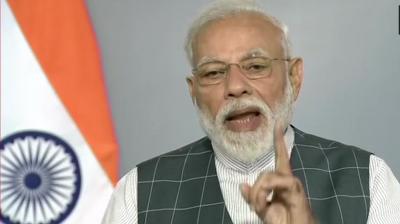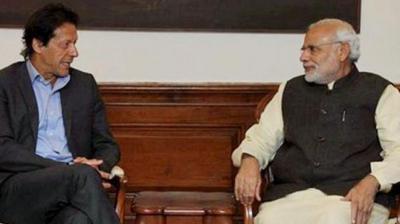
US house fails to override Trump’s veto on border emergency
The US House of Representatives on Tuesday (local time) failed to override the first veto issued by President Donald Trump on a resolution blocking his national emergency declaration that sought to fund the construction of a wall along the border with Mexico bypassing...
read more
Pakistan responds to India’s Anti-Satellite Missile Test
Pakistan said on Wednesday that it was against the militarisation of outer space, hours after India’s announcement of shooting down a live satellite with a missile - a rare achievement that puts the country in an exclusive club of space super powers. Prime Minister...
read more
Will take legal action against Cong’ conspiracy-driven election campaign: Sitharaman
A day after a videotape as part of its sting operation on demonetisation was played out by opposition parties, Union Defence Minister Nirmala Sitharaman on Wednesday hit out at the Congress and said the BJP will initiate legal action against the "conspiracy-driven...
read more
Arun Jaitley slams Opposition for claiming credit
Union Finance Minister Arun Jaitley on Wednesday slammed Congress for claiming that the process to develop anti-satellite (ASAT) missile began during previous UPA government, saying that Manmohan Singh government had refused to give permission for the testing of its...
read more
Congratulations and brickbats after A-Sat test, Cong credits UPA’s ‘vision’
Minutes after Prime Minister Narendra Modi announced on Wednesday that India has entered the super league of space countries; politicians across parties congratulated the government on India’s landmark success. Former DRDO Chief and NITI Aayog member Dr VK Saraswat...
read more
India has shot down satellite in orbit, now 4th nation in space power: Modi
Prime Minister Narendra Modi announced on Wednesday that India can now defend itself in space as its scientists had mastered the anti-satellite technology by shooting down a live low-earth orbit satellite. By doing so – and that too in just three minutes -- India had...
read more
Jacinda Ardern orders top level inquiry in Christchurch mosque shooting
New Zealand Prime Minister Jacinda Ardern on Monday ordered an independent judicial inquiry into the Christchurch mosque attacks, asking whether police and intelligence services could have prevented the March 15 attack. Ardern said a royal commission -- the most...
read more
Muellar probe doesn’t exonerate Trump, report needs to be released urgently: Pelosi
Top congressional Democrats said on Sunday it was "urgent" that the full report on Russian interference in the 2016 US election be publicly released, stressing it does not exonerate President Donald Trump. "The fact that Special Counsel (Robert) Mueller's report does...
read more
China welcomes friendly Modi-Khan exchange on Pakistan National Day
China on Monday welcomed the goodwill messages exchanged by Prime Ministers of India and Pakistan on the occasion of Pakistan National Day, saying it will play a constructive role and supports resolving the differences between the two nations through dialogue and...
read more
SC seeks EC reply on increasing VVPAT sample survey per assembly segment
The Supreme Court on Monday directed the Election Commission (EC) to reply by March 28 if it can increase the number of VVPAT sample survey from one in each assembly segment at present for the upcoming general and assembly elections. A bench comprising Chief Justice...
read moreSpending too much time online can create problems in real-life relationships, says study
Social media use may affect teenagers’ real life relationships
Even as effects of social media use on mental well-being is hotly debated, a new study says that spending too much time online can create problems in real life relationships of teenagers and vice versa.
Results of a survey conducted by Professor Candice Odgers of University of California, Irvine and her colleagues showed teenagers from low-income families reported more physical fights, face-to-face arguments and trouble at school that spilled over from social media. On the other hand, the researchers found that adolescents from economically disadvantaged households are also more likely to be bullied and victimised in cyberspace.
“The majority of young people appear to be doing well in the digital age, and many are thriving with the new opportunities that electronic media provides. But those who are already struggling offline need our help online too,” Odgers said. In a commentary published in the journal Nature, Odgers argued that while smartphones should not be seen as universally bad, vulnerable teenagers experience greater negative effects of life online.
“What we’re seeing now may be the emergence of a new kind of digital divide, in which differences in online experiences are amplifying risks among already vulnerable adolescents,” said Odgers, who is also a fellow in Canadian Institute for Advanced Research’s Child & Brain Development programme.
For the last 10 years, Odgers has been tracking adolescents’ mental health and their use of smartphones. In her survey of North Carolina schoolchildren, 48 per cent of 11-year-olds said they owned a mobile phone as did eighty-five per cent of 14-year-olds.
The study showed that teenagers from families with a household income of less than $35,000 per year spent three more hours a day on screen media watching TV and online videos than teenagers in families with an annual income of more than $100,000.The increased screen time could also convert to more problems offline, the findings showed.
“The evidence so far suggests that smartphones may serve as mirrors reflecting problems teens already have. Those from low-income families said that social media experiences more frequently spilled over into real life, causing more offline fights and problems at school,” Odgers said.
What makes you unfaithful to your partner decoded
Women who are less attractive are more likely to have an extra-marital affair, while men are more likely to be unfaithful when their partners were less attractive, finds a study that aims to identify factors that lead to infidelity — one of the surest ways to cause a breakup — as well as prevent it.
The tendency to devalue or downgrade, the attractiveness of potential romantic partners lowered the risk of infidelity and raised the likelihood of maintaining the relationship.
Faithful partners tend to evaluate romantic alternatives much more negatively, the researchers said.
“People are not necessarily aware of what they’re doing or why they’re doing it,” said lead author Jim McNulty, Professor at the Florida State University (FSU).
“These processes are largely spontaneous and effortless, and they may be somewhat shaped by biology and/or early childhood experiences,” McNulty added.
In the study, published in the journal of Personality and Social Psychology, the team analysed over 233 newly married couples who were shown photographs of highly attractive men and women and average-looking men and women.
They discovered that participants who quickly — in as little as a few hundred milliseconds — disengaged their attention from an attractive person were nearly 50 per cent less likely to engage in infidelity.
Conversely, partners who took significantly longer to look away from a romantic alternative had a higher risk of infidelity, and their marriages were more likely to fail.
Moreover, young, easily distracted partners and less satisfied with their relationships were more likely to be unfaithful.
Surprisingly, people satisfied with sex in their relationship were more likely to engage in infidelity, perhaps suggesting they felt more positive about sex in general and would seek it out regardless of how they felt about their main relationship.
Men who reported having more short-term sexual partners prior to marriage were also more likely to have an affair, while the opposite was true for women, the study said.








